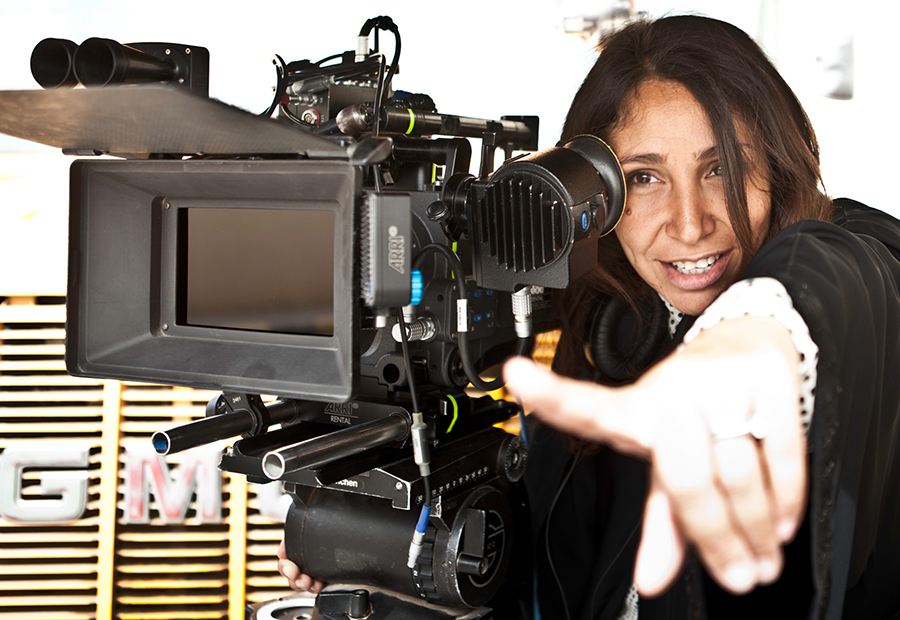
Although the film has a universally likable light-hearted side, its complexities portray several social and cultural issues facing women not only in Saudi Arabia, but many women throughout the Middle East. The film is also significant because it is the first full-length film to be entirely shot in Saudi Arabia, and it’s also the first Saudi film to be directed and written by a woman, Haifaa al-Mansour.
It can be hard to strike a balance, between using cinema as a conduit to bring light or invoke awareness about particular issues, and also creating a compelling story that resonates with a wider audience that may not understand the underlying social implications.
“I wanted a character that changes her destiny,” al-Mansour says in a recent interview with The Guardian. “It is easy to give up and to say the situation is bad in the Arab world and this woman is bad and this is what happens, and then what?”
With many Western films and TV shows focusing on certain prescribed aspects of the plethora of the region’s cultures, it’s refreshing to see a film such as Wadjda come along, a story that is coming from one direct source of reference, without the baggage of what a Western audience might think is politically correct. Namely, the film unflinchingly presents women’s social roles in Saudi Arabia, where all women are not allowed to drive automobiles, where women professors or teachers are not allowed to instruct male students face to face, and where women filmmakers such as al-Mansour are not allowed to openly direct their male cast members on a city street.
“It was very important for me to make a film that is emotional and moving and entertaining, and hoping people will see it back home and just enjoy watching a film and associate themselves with the film,” al-Mansour tells The Guardian. “It’s important not to see ourselves as us against the world. It’s more of us with the world.”
Al-Mansour is not the only woman filmmaker from the Middle East trying to evoke social commentary through their work. Ibtisam Mara’ana, a Palestinian filmmaker currently living in Israel, told her own personal story of leaving her Arab-Muslim village and moving to Tel Aviv in her 2010 movie 77 Steps. The film depicts her experiences of dealing with the prejudices she faced as a Palestinian women in a predominantly Israeli city.
“Women typically appreciate my movies and want to have a forum for these important issues,” Mara’ana tells the Christian Science Monitor. “But men, especially, surprisingly, educated ones, feel threatened.”
All of the films by Mara’ana, some feature and some documentary, tell personal personal stories that reflect women’s struggles within the Israeli-Palestinian conflict. Her 2008 documentary, Lady Kul el-Arab, focuses on a model from an Israeli religious minority, the Druze, who enters the Miss Israel beauty contest. What starts out as a documentary showcasing the pageant turns into a battle between the subject’s dreams of being in the pageant and the pressures from her community, who frown upon it, to withdraw. The woman eventually drops out, after receiving threats of dishonoring her family.
Nadine Labaki is a Lebanese director and actress. Her 2007 romantic drama, Caramel, debuted at the Cannes Film Festival. The movie depicts the stories of five Lebanese women and their dealings with repressed desire, the trials of marriage, and the deep societal traditions for women within Lebanese culture. As with Wadjda, the light-hearted narrative helps showcase stories that reflect bigger issues with women within a particular society.
In an IFC interview, Labaki discusses the idea of “Aayib,” which means “that’s shameful,” a phrase that parents often tell Lebanese girls.
“But you grow up, and you can be free and be applying this freedom, and still you have a lot of self-censorship and self-control because you don’t want to hurt the people around you, your family, your education, your religion,” Labaki tells IFC. “You are confused: Are you this free woman who’s doing what she wants, or are you a more conservative woman? You are searching for your identity.”
There are many women– not just filmmakers– in parts of the Middle East, where women often still do not have the same rights as men, who are making great strides in advocating for women’s rights. Like the filmmakers mentioned here, these women are striving to showcase and demonstrate the small, daily aspects of their lives that are restricted, aspects that many people outside the region take for granted.
Manal al-Sharif is a Saudi women’s activist trying to give women the same driving privileges as men. In 2011, she was imprisoned for nine days after being seen driving an automobile. Her arrests sparked outrage around Saudi Arabia and internationally.
“Women tell me they are different since 21 May, the day I was arrested,” al-Sharif tells the BBC. “It’s a positive change, they believe now. [Driving] is one of our smallest rights. If we fight, we can build women who trust themselves, have belief to get the bigger rights we are fighting for.”
And that simple idea, that one small action will lead to bigger ones, continues to drive these intelligent, determined women.
Colby Tibbet studies journalism at Fresno City College. He is the Filmworks media relations and communication intern.
